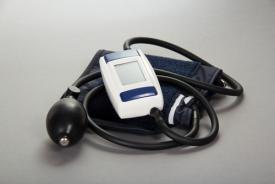We have yet one more new technology that is combining both personal health records along with a credit card to make payments. It comes with a reader that connects via USB to view the information on a computer. The process to allow a doctor to have access requires a special card reader if I am interpreting this correctly. The Life Nexus card requires a download of desktop software so you can enter information into your PHR (personal health record). The card is designed to work with Health Savings Accounts and the web site offers information on how they will be marketing the card to insurance companies. The site also speaks of marketing the card to corporations. It uses the iChip security method and states it is HIPAA compliant. I think more information will need to follow here as you can see this is an attempt to tie financials with healthcare in on technology as it is being driven by LifeNexus banking partners. I did not download and look at the software and I did not see any integration with other PHRs mentioned here on the site. The board of directors looks like a combination of investors and others in the health tech payer systems. BD Press Release:
BROOMFIELD, Colo., Feb. 15, 2011 /PRNewswire/ — LifeNexus today announced the launch of the first multi-purpose electronic health card utilizing an embedded microcomputer, the iChip™, for securely maintaining an individual’s personal health record, in concert with a payment card. The LifeNexus Personal Health Card® is a novel, secure mobile technology that helps individuals care for their loved ones by putting them in control and at the center of their personal healthcare. The LifeNexus Personal Health Card stores comprehensive health information for individuals and their family members, including demographic data, emergency contacts and insurance information along with medical records, which include medical history, immunizations, allergies and prescriptions. This provides for quick and secure digital access to vital and potentially life-saving information when and where it’s needed most – at the point of care. “The advantage of the Personal Health Card is that the consumer is in control of the information, and a lot of the red tape is eliminated,” said Boyd Lyles, Jr., M.D., founding director, Heart Health and Wellness Center, Dallas, Texas. “Even offices that have paper records can use the Personal Health Card to help them transition to electronic patient/physician records.” LifeNexus’ development efforts included working for more than three years with key stakeholders across multiple industries, including; MasterCard® Worldwide, Visa®, VeriFone and Emdeon, Inc., a leading provider of healthcare revenue and payment cycle management solutions, who collaborated on this product. “There is enormous value in an electronic health card for all parties involved in the continuity of care,” said Howard Burde, principal, Howard Burde Health Law, LLC., advisory board member of the Health Information Management and Systems Society (HIMSS) and author of “Personal Health Records”, published by HIMSS. “It will help make electronic medical records viable and is a critical piece in the creation of a digital healthcare information exchange. Most importantly, it will help address the three biggest challenges in healthcare: lowering costs, improving patient outcomes and ensuring privacy.” Privacy & Security An individual’s personal health record is stored on the card’s embedded microcomputer, the iChip, which is encrypted and password-protected, providing a highly secure environment that the individual owns and controls. There is also a digital credential on the card, which assures the protection of identity and privacy as well as helps to reduce fraud. The consumer ensures privacy between themselves and their healthcare provider through consumer-authorized access. An individual’s information stays in their wallet, not a web-based server. Not only does this eliminate consumer concerns about transferring and storing sensitive data on a third party web-based server, it also supports the adoption of electronic medical records by their physician, which requires both a third-party credential and a digital personal health record. The card complies with both the Health Insurance Portability and Accountability Act (HIPAA) Privacy Rule and the security and privacy mandates under the new American Recovery and Reinvestment Act. “The card makes vital information available to healthcare providers in times of an emergency, enabling rapid admission and improved care,” said Christopher Maus, CEO, LifeNexus. “In addition, by helping to improve outcomes, the card helps improve the physician-patient relationship and the overall patient experience, and it supports the best quality of care for each individual and their family members.” Payment Functionality The multi-functionality of the LifeNexus Personal Health Payment Card™ provides an additional and exceptional benefit. If individuals choose to have the Personal Health Card on a payment card, they can make purchases, providing a convenient way to manage their health-related information and make general day-to-day purchases on the same card. The LifeNexus Personal Health Payment Card can be offered by financial institutions with either prepaid, debit or credit functionality. Individuals can use their card to make general payments the same way they use their existing MasterCard or Visa cards today. It can also be used to allow access to Health Savings Accounts, Flexible Spending Accounts and Health Reimbursement Arrangements. The microcomputer on the front of the card and the magnetic payment function on the back ensure that health and financial information remain separate and secure. The LifeNexus Personal Heath Card is scheduled for release in February 2011. About LifeNexus LifeNexus introduces a new era in portable health records with the Personal Health Card®. This technology was designed specifically for maintaining an individual’s Personal Health Record (PHR) on a card in their wallet. The patented iChip™, “Individually Controlled Health Information Platform™,” utilizes mobile server technology to securely store critical information including prescriptions, medical history, allergies, insurance data, emergency contacts, physician notes, as well as other key information. Individuals authorize access to critical information at the time and point of need. With sensitive information securely encrypted, password protected and “Off-the-Web” the consumer is in absolute control with the iChip. Now individuals can manage their personal health information and at their choice, the iChip can be applied to payment cards, conveniently making general day-to-day purchases on the same card.






